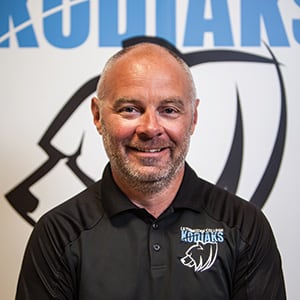How To Stay Sharp in Your Sport (Even While Stuck At Home)
Athletic competition was brought to an abrupt halt in March 2020, but as every athlete knows – the competition never sleeps, even during a pandemic. So we asked our Kodiaks coaches for their tips on how to stay sharp and improve fundamental skills, even while stuck at home.

SEAN CAREY – Men’s and women’s soccer and futsal
The 2019 Canadian Collegiate Athletic Association (CCAA) Men’s Soccer Coach of the Year shares some simple tips for improving individual skills from home.
- Juggling: Juggling is a simple drill everyone can do at home. All it takes is a ball. Set a new personal best and then keep trying to break it.
- Developing a feel for the ball: While you’re studying at home, have a ball at your feet and keep rolling it around. It’s a great way to constantly develop a feel for the ball.
- Learn from the pros: Watch professional soccer and concentrate on the players that play the position that you play. You can learn a lot from how they play the game. Carey recommends watching Leeds United in the English Premier League, which is his team of choice.

SIMON SCHAERZ – Women’s and men’s cross country and indoor track
The 2019 Alberta Colleges Athletic Conference (ACAC) Cross Country Coach of the Year helped lead his cross country team to a CCAA national gold medal last year. If you’re looking to build up to a 5K and beyond, here are his tips for training – even in the cold Alberta winter.
- Goal setting: Work to establish consistency. Start by setting a goal, which usually is a target time to run your 5K and the date by which you want to achieve that target time. Then, find someone who will hold you accountable. It might be someone who wants to join you in your training or a coach who will check-in and motivate you.
- Training to build up to a 5K: Balance is key to a strong training approach. Combining sessions with continuous low-intensity runs with shorter interval-based high intensity runs (one to three times a week) will help you work up to your goal. Balance your training with good nutrition, sleep and recovery.
- How to get started: Start with a frequency and intensity that is manageable. It’s important that it fits into your lifestyle. This may only be one or two runs per week, which is more than OK. The important thing is to establish some initial momentum. Once you have some momentum, you can gradually add more and/or longer runs. Find someone who holds you accountable, as your chances of success are much higher when you have someone in the trenches with you. Lastly, keep a training journal. It helps to look back and see where you started.

ANNA SCHWARK – Women’s volleyball
Volleyball may be a team sport, but there’s lots you can do to improve your game on your own. Coach Schwark shares the tips she’s given her team.
- Film: Watching yourself can help you identify common mistakes or poor habits, while watching someone else playing a higher level can help you identify their skills and good habits for you to create. Using film to break down a specific skill is also helpful and can be done by yourself.
- Visualization: While training opportunities are limited, now is a great time to get started on sport performance visualization. You can visualize the best game you’ve ever played, or a real-time game where you must adapt to what your brain throws at you. By the time you step foot on the court for game time, you won’t even be nervous because you’ve played the game 1,000 times in your head already!
- Positive self-talk: If you tell yourself you can’t do it, chances are you can’t. By telling ourselves we can, we open up a whole new world of possibilities. When negative self-talk starts to creep in, just acknowledge it. Just make sure to quiet that voice with some positive self-talk.
- 2 v. 2 gameplay: Mini games can be really beneficial for developing defensive reading skills. You only need four people in two teams. Not having a blocker allows both players in backrow defence to rely on the visual cues the hitter is giving them. On defence, ask yourself what direction is the hitter approaching?Where are they looking? Is their hand open to swing or closed to tip? Athletes of all ages can use drills like this to improve their defensive reading skills!
Story by Jamin Heller
50 Kodiaks named national scholars
The Lethbridge College Kodiaks excelled not just in competition during the 2019-20 season, but in the classroom as well. A total of 50 Kodiaks student-athletes have earned Canadian Collegiate Athletic Association (CCAA) National Scholar honours – the most of any Alberta Colleges Athletic Conference (ACAC) institution, and second most in Canada. To be named a national scholar, student-athletes must earn a grade point average of at least 3.3, while also competing for a registered athletics team. Congratulations to these outstanding student-athletes:
- Women’s basketball: Kirsten Barwegen, Montana Berezay, Emily Greeno, Abigail Hall, Kaylin Larson, Catriona Smith and Jennafer Taylor.
- Men’s basketball: Trey Bohne, Brock Dewsbery, Drake Harker, Jackson Kasko, Brigham Smith and Jett Stef.
- Cross country running: Cooper Cheshire, Justin Fisher, Rosie Bouchard, Anna LeBlanc, Kayla Munro and Millie Stafford.
- Men’s soccer: Christopher Anton, Jimmy Bukuru, Luis Fonseca and Jaden Veluw.
- Women’s soccer: Suzana Brkic, Ailsa Fallows, Sydney Hope, Meagan Judge, Stephanie Klassen, Alexandra Morrison, Christine Moser, Victoria Noronha, Jasmin Salmon, Ashley Sazalski and Micaela Stone.
- Women’s volleyball: Claire Armstrong, LeeAnne Arnott, Jamie Brown, Morgan Bullerwell, Johanna Dixon, Elyse Doble, Carley Doneff, Harper Elwood, Maile Funa and Rae Whitehead.
- Men’s volleyball: Malcolm Fisher, Jackson Gaehring, Nathanael Heyburn, Michael Kindley, Michael Svab and Zachary Wikenheiser.
 Valgardson Follows in Parent’s Footsteps
Valgardson Follows in Parent’s Footsteps
It could be said the latest Kodiaks recruit is returning to his natural habitat. Karson Valgardson, whose parents are both members of the Kodiaks Hall of Fame, committed to join the Kodiaks men’s basketball program last fall. Valgardson is a 6-foot-5 forward who earned a 4A first team all-star nod with Chinook High School in his senior season. Born and raised in Lethbridge, Valgardson is the son of Jason and Carmen (Knutson) Valgardson, who were both members of Kodiaks basketball teams now enshrined in the Kodiaks Hall of Fame.
“Karson is a very coachable player who excelled at Chinook High School, both on the court and in the classroom,” says Kodiaks men’s basketball head coach Ryan Heggie. “He’s a bit of a throwback player who can score and defend several positions.” Valgardson says it’s a privilege to put on the same Kodiaks jersey that his parents did three decades ago. “It’s a great honour to be part of a program that has enjoyed so much success and produced so many great players,” says Valgardson. “I am looking forward to playing at the next level, playing for coach Heggie and getting to know my new teammates.”
Valgardson will strive to continue the family tradition of winning while representing Lethbridge College. After all, his parents were members of some of the most successful basketball teams in Kodiaks history. Their son and his teammates are looking to replicate that level of success at the first opportunity to compete. In the meantime, with restrictions in place due to the pandemic, they continue to train and develop key skills both on- and off-court during this winter semester – and can’t wait to see where that takes them next.
Story by Jamin Heller | Photo courtesy the Valgardson family


